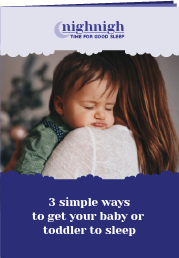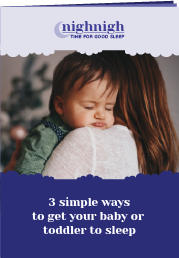
This is the age when many developmental milestones are achieved and sleep patterns change dramatically. Waking as much or more than when they were in the newborn phase, catnapping can be occurring both day and night. How exhausting to be going back to more waking and longer settling!
You might resort back to some of the sleep tools you used when your baby was a newborn like white noise?
Helping settle older babies that have now developed millions of brain cells since birth requires a different approach. White noise in its simplicity cannot compete with brain engagement like a lullaby can. Basically, your white noise is too dull for the brain to engage so your baby no longer responds.
There are many factors that can impact on your child’s sleep in this age range.
-
Watch out for teething pain. Cooled teethers may help soothe gums prior to sleep. Analgesia, gum soothing gels and lullaby music are all proven methods. We suggest a combination approach for settling and soothing your waking baby.
-
Nappy rash can flare up with teeth eruption. A soothing nappy rash cream applied thickly can help with the discomfort that can wake them up. Even apply as a preventative when you see the teething symptoms of dribbling, red cheeks and desire to chew on objects with purpose. We find the combination of zinc based diaper creams with a dusting of corn flour powder a very efficient and healing combination.
-
Hunger can be an issue if they are growing rapidly and using up calories. Try extra feeds or protein-based snacks before bedtime like cheese, yoghurt or whole-meal cheese or mashed egg sandwich. This is often a time when nursing momma’s can doubt their milk supply and lack of sleep and stress, doesn’t help. Rather than opting for formula top ups, a snack might keep your growing baby sustained for longer and keep you breast-feeding for longer.
-
Separation anxiety can be a huge issue from about six months on. This is where the term ‘velcro baby’ comes into play…literally stuck to you! You are your little ones security blanket and he will be seeking your reassurance that all is ok. This means he will want to go everywhere with you and insist on clinging to you during the day and wanting you close by at night. This phase can also continue for months meaning your chance of getting a little peace and quiet is limited when your toddler refuses to sleep.
-
Your bedtime routine should be no more than 20 MINUTES start-to-finish once pj’s are on and settling begins. Keep sleep times as regular and consistent as you can. Your older baby will likely want you to stay with them and regardless of your sleeping arrangement, you may not be ready to settle down for the night at 7pm, especially if you have other children. This is the perfect time to introduce Lullaby Sleep Music. Stay with your baby and re-connect and as baby relaxes, the music should allow you to leave, while baby falls into deeper sleep. Keep your music choices very simple and repetitive. Your baby will love you to sing to them.
-
Your older baby will become overtired just as quickly as when they were younger, so continue to watch for the early tired signs. Eye rubbing, yawning, disinterest and irritability to name a few.
RELAXATION IS THE KEY to quick settling. The combination of you being with them for reassurance and using appropriate sleep music to help them relax, will mean they learn to associate the same music as their sleep cue. If you can sing to your baby you will be enhancing your bond with them and they will be growing brain cells based on that experience.
Nurturing your older baby to learn good sleep habits and having them use lullaby sleep music as their relaxation sleep cue in infancy can become a life long habit. Music is the perfect tool for relaxing.
Just look at how you feel when you listen to music. Doesn’t it help your mood?






